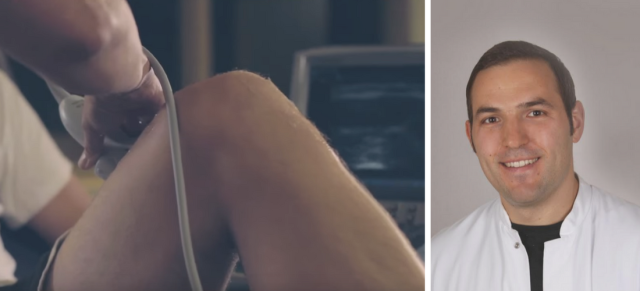
Болезнь Осгуда-Шлаттера - это нарушение развития, вызывающее проблемы с опорно-двигательным аппаратом и редко встречающееся в обычной популяции. Однако это заболевание чаще встречается у подростков, занимающихся спортом, и составляет примерно 3-5 % от общего числа людей; оно вызывает болезненное воспаление ниже колена у подростков и может привести к необратимому повреждению мягких тканей. Часто заболевание диагностируется с помощью МРТ, которая является дорогостоящей и непрактичной для целей скрининга.
Д-р. Ральф Дойшер (Ralf Doyscher) из отделения спортивной медицины Берлинского университета Шарите (Charité - Universitätsmedizin Berlin) недавно принял участие в исследовании элитных молодых футболистов, в рамках которого рассматривалось ультразвуковое исследование в точке наблюдения (POCUS) как альтернативный подход к диагностике болезни Осгуда-Шлаттера.
"Группу спортивной медицины Шарите попросили провести общую проверку здоровья элитных молодых футболистов, участвующих в региональной программе поддержки, - объясняет доктор Дойшер, - и мы воспользовались возможностью одновременно изучить потенциал POCUS в качестве скринингового инструмента для выявления игроков, которые могут страдать болезнью Осгуда-Шлаттера.
"Мы обследовали почти 400 игроков в возрасте от 12 до 14 лет и выявили шесть игроков с патологиями, указывающими на болезнь Осгуда-Шлаттера, все из которых были позже подтверждены с помощью МРТ. Хотя это только начальное исследование, полученные результаты указывают на то, что ультразвук хорошо подходит для скрининга на болезнь Осгуда-Шлаттера."
"Ультразвуковые системы POC, такие как система FUJIFILM Sonosite Edge®, использованная в этом исследовании, предлагают удобную и экономически эффективную альтернативу МРТ для скрининга, и я считаю, что этот подход может принести пользу молодым игрокам в ряде других беговых видов спорта."
Применение УЗИ и спортивной медицины
Узнайте, как технология УЗИ и визуализации игл компании OnoSite может помочь получить ответы на вопросы в офисе, на поле или почти везде, где случаются спортивные травмы на нашей странице специализации спортивной медицины. Или посмотрите наше видео о том, как доктор Дирк Теннер работал с командой Radio Shack с помощью портативного аппарата Sonosite ультразвукового аппарата.

